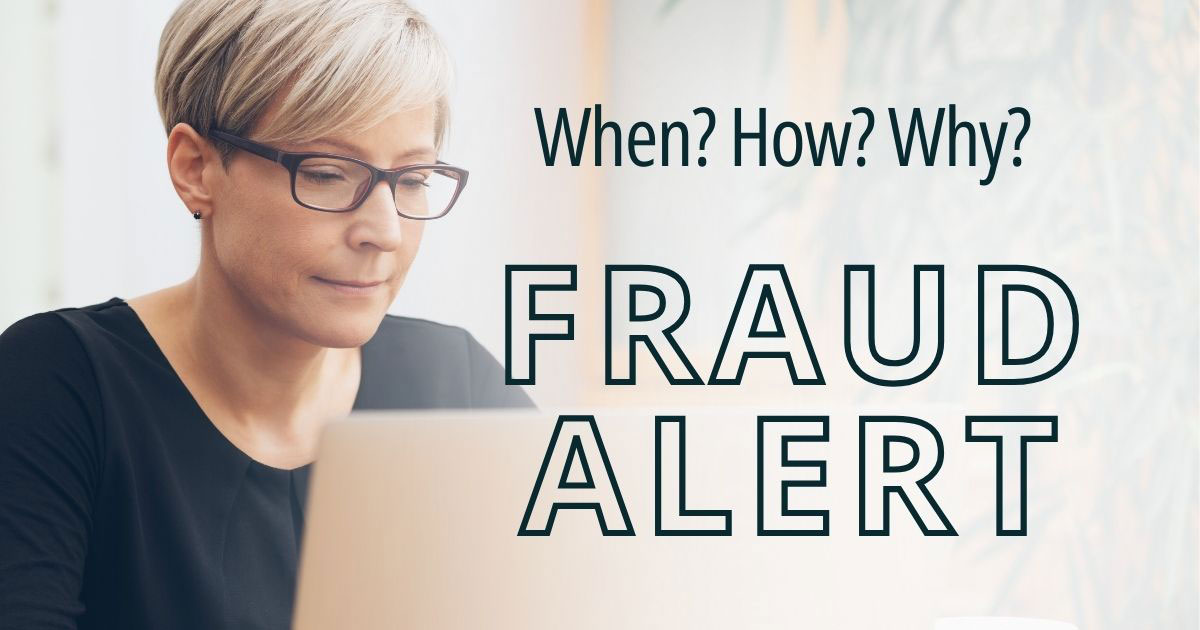Who can place a fraud alert?
Anyone who suspects you have been, or are about to be, a victim of identity theft or fraud can place a fraud alert on their credit report. Appropriate if your wallet has been stolen or if you’ve been taken in by a phishing scam.
What does a fraud alert do?
A fraud alert will make it harder for someone to open a new credit account in your name. Potential creditors must use what the law refers to as “reasonable policies and procedures” to verify your identity before issuing credit in your name. Basically, a business must verify your identity before it issues new credit in your name. The steps potential creditors take to verify your identity may not always alert them that the applicant is not you.
When you place a fraud alert on your credit report, you can get a free copy of your credit report from each of the three credit bureaus.
Duration: A fraud alert stays on your credit report for at least 90 days and up to one year. After a year, you can renew it.
Cost: Free
How to place a fraud alert: Contact any one of the three credit bureaus — Equifax, Experian, and TransUnion. You will need to provide appropriate proof of your identity, which includes your Social Security number, name, address and other personal information that the credit bureau requests. You don’t have to contact all three. The credit bureau you contact must tell the other two to place a fraud alert on your credit report.
Extended Fraud Alert
Who can place an extended fraud alert?
An extended fraud alert is only available to people who have had their identity stolen and completed an FTC identity theft report at IdentityTheft.gov or filed a police report.
What does an extended fraud alert do?
Like a fraud alert, an extended fraud alert will make it harder for someone to open a new credit account in your name. A business must contact you before it issues new credit in your name.
When you place an extended fraud alert on your credit report, you can get a free copy of your credit report from each of the three credit bureaus twice within one year from when you place the alert, which means you could review your credit report six times in a year.
In addition, the credit bureaus will take you off their marketing lists for unsolicited credit and insurance offers for five years, unless you ask them not to.
Duration: An extended fraud alert lasts seven years.
Cost: Free
How to place an extended fraud alert: Contact any one of the three credit bureaus — Equifax, Experian, and TransUnion. You will need to provide appropriate proof of your identity, which includes your Social Security number, name, address and other personal information that the credit bureau requests. You don’t have to contact all three. The credit bureau you contact must tell the other two to place an extended fraud alert on your credit report.
What Doesn’t A Fraud Alert Do?
While a fraud alert can help keep an identity thief from opening new accounts in your name, it will not:
- Protect you from an identity thief using your existing credit cards or other accounts.
- Protect you from an identity thief opening new accounts in your name that do not require a credit check – such as a telephone, wireless or bank account.
And, the fraud alert alone won’t stop any identity theft that is already under way.
Sources:
https://consumer.ftc.gov/articles/what-know-about-credit-freezes-and-fraud-alerts#alerts
https://www.raymondjames.com/privacy-security-and-account-protection/credit-report-fraud-alerts
CSP #576097 Exp. 8.20.25




